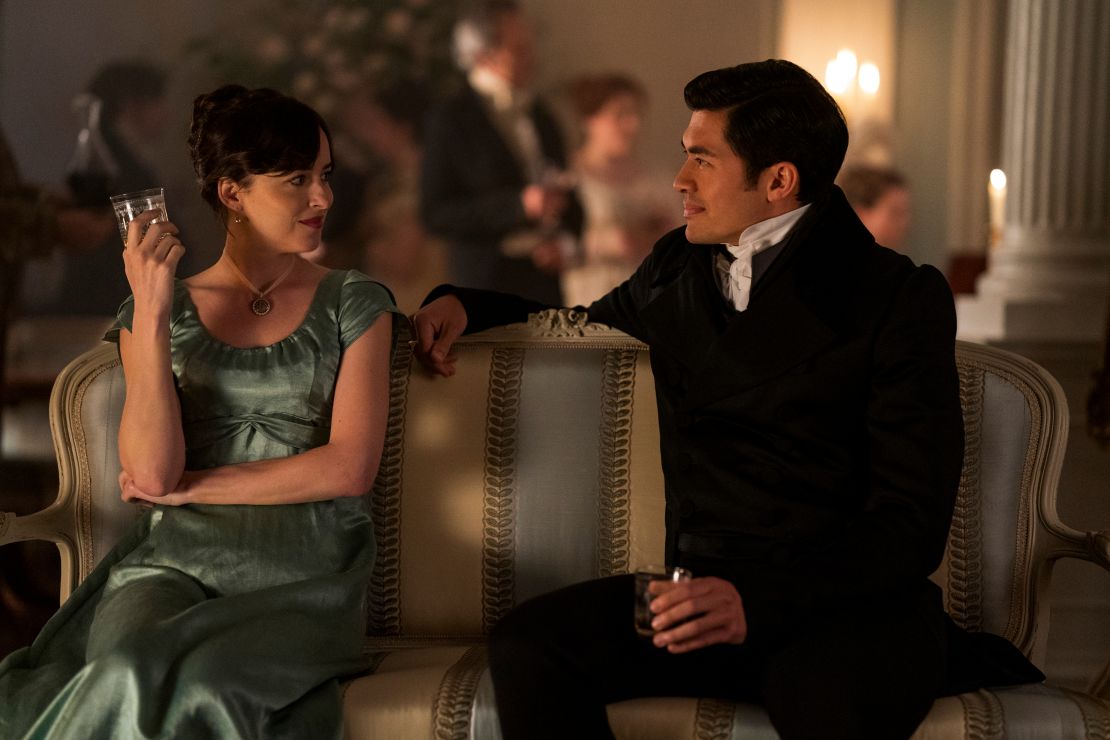Editor’s Note: Holly Thomas is a writer and editor based in London. She is morning editor at Katie Couric Media. She tweets @HolstaT. The opinions expressed in this commentary are solely those of the author. View more opinion on CNN.
The dresses? Empire line. The biscuits? Pastel-colored and untouched. The dialogue? Yassified. The glances to camera? Wry. It can only be: Netflix’s “Persuasion.”

Allow me to be the first to congratulate Netflix on this latest coup. From the moment the trailer – complete with facepalm-worthy meet-cutes, Dakota Johnson as heroine and almost-spinster Anne Elliott breaking the fourth wall and an all-caps reminder of who the original author was – was released, Jane Austen fans have been cracking their knuckles and sharpening their metaphorical quills in readiness for the main event.
Ticking off an entire demographic of English majors (or in the case of the more committed Brits, English students) is an innovative means of securing a viewership, and dare I say, it has worked beautifully.
For the avoidance of doubt: I’m not blind. As far as its critical reception is concerned, the film has bombed. Reviewers have despaired at Johnson’s “feisty” Anne, the film’s “condescending” tone and its “gimmicky” script; some called for a moratorium on “Fleabag” callbacks for the foreseeable future. Everyone who’s come within spitting distance of a Jane Austen novel is convinced they’ll hate the movie in advance. Yet everyone I know who has is still making a date to watch it. I’d argue that makes it a roaring success.

I’ll use a jarring modern-day reference to explain. There’s a scene in “Frasier” in which Frasier Crane and his brother Niles are conducting a spirited postmortem on a dinner they’ve just had. Niles liked the dinner, but is nevertheless bemoaning the lack of an outstanding cognac, to which Frasier replies: “Think of it this way, Niles: what is the one thing better than an exquisite meal? An exquisite meal with one tiny flaw we can pick at all night.”
This is exactly what “Persuasion” does. Except rather than offer us just one tiny flaw to savor, it serves up a banquet platter buckling under them. Rather than subtle and restrained, the humor is slapstick and tired. Rather than a slow build of romantic tension, innuendo punctures every scene.
Rather than commit to the sincerity of its source material, it attempts a Phoebe Waller-Bridge caricature replete with labored one-liners (“If you’re a five in London you’re a ten in Bath”). It’s an Americanized pastiche of Regency England that couldn’t be more perfectly designed to lure enraged viewers from Britain and wounded Austen fans from anywhere. It’s a work of marketing genius, and in many ways, it’s also the natural conclusion of a decades-long transatlantic exchange.

For years, we Brits have peddled a superficial, Richard Curtis-esque version of ourselves in movie theaters across the pond in films like the Bridget Jones franchise, “Love Actually,” “Notting Hill,” and “Four Weddings and a Funeral.” If our on-screen avatars are to be believed, British men are all posh, floppy-haired perverts (or if they’re nice: just frigid), and our women are all “chubby,” wine-guzzling romantics.
We all live in aristocratically shabby homes in central London, and migrate to country estates for special occasions. We’re incapable of expressing ourselves honestly less than several years into any relationship. We stutter. We’re obsessed with setting up our single friends, and we’re walking encyclopedias of Beatles lyrics.
The conceit was so effective that, really, it was only a matter of time before the Americans turned the game on its head and started serving Britishness back to us. This started slow, then gathered pace – often with the help of one of our most beloved authors. Whit Stillman’s “Love & Friendship” (2016), a witty interpretation of a lesser-known Austen novel, “Lady Susan,” had the sense to cast Kate Beckinsale, who cut her teeth on Merchant Ivory roles, as the lead. Autumn de Wilde’s Emma starring Anya Taylor-Joy in 2020 was a decidedly slicker, more airbrushed iteration than Douglas McGrath’s starring Gwyneth Paltrow in 1996, but still consistent with the book in spirit.
Netflix made a more audacious departure from realism with “Bridgerton” (for clarity: definitely not based on Austen’s work, though theoretically set in its general period), which was released on Christmas Day 2020. Bridgerton’s master stroke, as crafted by Los Angeles-based creator Shonda Rhimes and showrunner Chris Van Dusen, was to deliver an Instagram-able version of Regency England that made its historical inconsistencies a virtue.
Brits and classic literature fans alike loved picking it apart (no way would a Viscount shag in broad daylight! As if half of Mayfair would attend artsy orgies every week!) – but we still swooned, gasped and chuckled exactly where it wanted us to. Apparently emboldened, Netflix set its sights on “Persuasion,” giving us the opportunity to make the leap from indulgent nit-picking to full-on hate-watching.
I’m not convinced this is so very terrible. Jane Austen fans (or Janeites, as they are internally known) have been long spoiled by earnest, faithful renditions – think Ang Lee’s “Sense And Sensibility” or the BBC’s “Pride And Prejudice” in the mid-1990s. Perfectly fine variations that aren’t lucky enough to feature Emma Thompson or Colin Firth risk fading into obscurity (think Patricia Rozema’s “Mansfield Park” in 1999 or Jim O’Hanlon’s “Emma” in 2009).
Whether we’re drawing from Austen or not – and we seem to be fonder of revisiting her than any other author of her era – audiences on both sides of the Atlantic have a seemingly inexhaustible appetite for Regency-era shlock. Given that Austen fanatics have a comparable zeal for criticizing sub-par adaptations, allowing them to let their freak flag fly by making the worst one to date is inspired.




